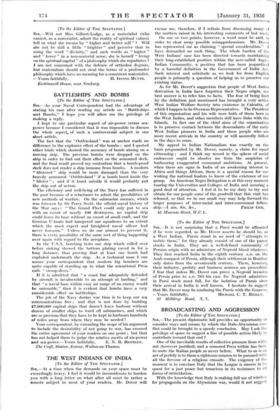BATTLESHIPS AND BOMBS
[To the Editor of THE SPECTATOR.]
SIR,—As your Naval Correspondent had the advantage of stating his case after reading my article on " Battleships and Bombs,". I hope you will allow me the privilege of making a reply.
I kept to one particular aspect of air-power versus sea- power because I considered that it was impossible to discuss the whole aspect„„ of such a controversial subject in one short article.
The fact that the Ostfriesland ' was at anchor made no difference to the explosive effect of the bombs ; and I quoted other trials which showed the accuracy of bomb aiming on a moving ship. The previous bombs were dropped on the ship in order to find out their effect on the armoured deck, and the final result proved my contention that a bomb-proof deck does not render a ship immune from bombs. A modern " blistered " ship would be more damaged than the very heavily armoured Ostfriesland ' if a bomb burst inside the " blister " ; and if it burst outside it would probably put the ship out of action.
The efficiency and well-being of the Navy has suffered in the past because of a reluctance to admit the possibilities of new methods of warfare. On the submarine menace, which' was foreseen by Sir Percy Scott, the official naval history of the War says " The Grand Fleet could only .put to sea with an escort of nearly 100 destroyers, no capital ship could leave its base without an escort of small craft; and the German U-boats had hampered our squadrons to an extent which the most expert and farsighted naval officer had never foreseen." Unless we do our utmost to prevent it, there is every possibility of the same sort of thing happening over again with regard to the aeroplane.
In the U.S.A. bombing tests one ship which rolled over before sinking showed the bottom plating caved in for a long distance, thus proving that at least one bomb had exploded underneath the ship. As a technical man I can assure your correspondent that modern big bombers are quite capable of standing up to what the sensational Press calls " swoop-dives."
If it is admitted that " a coast line adequately defended by aircraft is invulnerable to an attempt at landing," and that " a naval base within easy air range of an enemy would be untenable," then it is evident that bombs have a very considerable effect on battleships.
The job of the Navy during war time is to keep our sea communications free ; and that is not done by building 17,000,000 capital ships that daren't leave harbour without dozens of smaller ships to ward off submarines, and which are so precious that they have to be kept in harbours hundreds of miles away from where they may be needed Your correspondent, by extending the scope of his argument to include the desirability of not going to war, has ensured the entire agreement of your readers on one point ; but that has not helped them to judge the relative merits of air-power










































 Previous page
Previous page